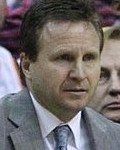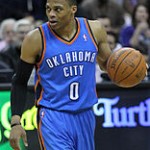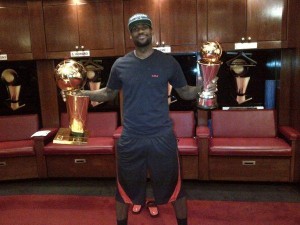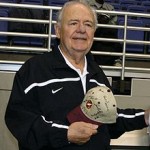 Through his very last timeout huddle with his team, Oklahoma City Thunder coach Scott Brooks said all the right things.
Through his very last timeout huddle with his team, Oklahoma City Thunder coach Scott Brooks said all the right things.
“We’re gonna treat them like they’re the champions,” Brooks instructed his club. “After this game, we’re gonna walk and shake their hands and acknowledge all of them. They beat us fair and square. However hard that hurts, they beat us fair and square. Give them credit.”
Yes, Brooks said all the right things.
It would have been nice if he had done all the right things.
Time will dull the memory of the 2012 NBA Finals. It will be remembered as the long-awaited coronation of LeBron James and show that the Heat dispatched the Thunder in five games, winning the last four.
That won’t reflect how close the Thunder actually came to positioning themselves to win an NBA title. The first four games were decided by a grand total of five points. Games 2, 3 and 4 all were in the balance in the final minute, and Oklahoma City somehow lost them all.
Yes, much of that failure falls upon the players. Russell Westbrook took 120 shots, or 12 more than James. Kevin Durant had 30 rebounds, or the same total as “too small” Dwyane Wade. James Harden had 18 baskets and 12 turnovers. The other five players in OKC’s primary rotation produced a total of three games in double figures.
It’s hard to win when players don’t perform up to expectations. But it’s almost impossible to win when the coach doesn’t, either.
Brooks allowed the clock and not the flow of the game to determine how he used his timeouts. He never fully explored the premise of a zone defense, which has bothered the Heat over the last couple of years. He never went to a 1-3 pick-and-roll, which depending on matchups could have put James or Shane Battier on the quicker Westbrook and Dwyane Wade or Mario Chalmers on the taller Durant.
In Game 3, Brooks sat Westbrook alongside a foul-plagued Durant for more than five minutes of the third quarter, allowing a double-digit lead to entirely evaporate and the American Airlines Arena crowd to get back in the game.
In Game 4, he refused to use a 20-second timeout in the second quarter as a 17-point lead was disappearing with his reserves on the floor, drawing public criticism from his own players.
“I just don’t understand why we start out the first quarter the way we did, with the lineup we had, and all of a sudden we change and adjust to what they had going on,” center Kendrick Perkins said. “If it ain’t broke, don’t fix it.”
And in the final 20 seconds of Game 4 – a stretch that would determine whether his team would fall into a hole that no Finals team had ever climbed out of or pull dead even with the Heat while reclaiming the homecourt edge – Brooks did not address to his players the potential scenario of Miami winning a huge jump ball, with the shot clock having been reset from 0.8 seconds to 5 seconds.
“One play does not determine the outcome of a game,” Brooks said.
Absolutely right, coach.
That one play determined the outcome of the series.
In Game 3, Brooks was hamstrung by Durant’s foul trouble. His superstar picked up his fourth foul  with 5:41 left in the third quarter and took a seat in favor of Harden. Just 40 seconds later, he inserted Derek Fisher for Westbrook, who had two turnovers and two wild shots in under 90 seconds.
with 5:41 left in the third quarter and took a seat in favor of Harden. Just 40 seconds later, he inserted Derek Fisher for Westbrook, who had two turnovers and two wild shots in under 90 seconds.
On Westbrook, Brooks explained he had to “kind of calm him down,” and the move initially looked good when Fisher stuck a four-point play to give the Thunder a 10-point lead. But “calm down” somehow morphed into “go sit in the corner” and Westbrook inexplicably remained on the bench – alongside Durant – until the start of the fourth quarter.
By that time, a lineup of Harden, Fisher, Perkins, Thabo Sefolosha and Serge Ibaka had frittered away the lead, amassing three made free throws in 10 possessions over four-plus minutes. By the time Durant and Westbrook re-appeared, Oklahoma City’s momentum and Miami’s self-doubt had disappeared.
Westbrook is just 23 and by many accounts the game’s most athletic player. In a series in which James averaged 44 minutes and Wade averaged nearly 41, did Westbrook really need to be limited to 39?
“It’s hard to play 24 straight minutes at the high level that he plays at both ends of the floor in a major
playoff game,” Brooks explained.
“Coach makes the decisions,” Westbrook said. “He’s been making them all season. So I just roll with it.”
In Game 4, Westbrook was the best player on the court. His quick start pushed the Thunder to a big early lead and had Heat coach Erik Spoelstra looking for any way to stop the avalanche. Spoelstra already had used one full timeout and didn’t want to use another. So as soon as the clock dipped inside three minutes, he used a 20-second timeout to trigger OKC’s mandatory full timeout.
RELATED CONTENT: Last 90 seconds that doomed Thunder
RELATED CONTENT: Durant the ideal NBA superstar
The Thunder held a 17-point lead until Norris Cole closed the first quarter with a 3-pointer. The Heat gained some momentum and began chipping away. At the 10:19 mark, Brooks used a full timeout, which really didn’t stem the tide.
Even with the extra TV timeout the second and fourth quarters provide, and even with the knowledge of the blown lead in Game 3, Brooks didn’t use his 20-second timeout to allow his team to keep some semblance of control. He ended up not using it for the half, and by that time, the Heat had regained their footing.
However, that omission was nothing compared to the closing seconds, when the Thunder trailed by three and Brooks never informed his team to play straight up and not foul should the Heat win the jump ball. Harden said there was no discussion of that possibility, which is unacceptable at this level of the game.
For those who believe Westbrook should shoulder most of the blame for intentionally fouling with less than five seconds on the shot clock, go right ahead. He is a point guard, an extension of the coach on the floor, the player who must understand clock and score better than anyone, and – most important – convey it to his teammates. And to Westbrook’s credit, afterward he called it a “miscommunication on my part.”
But Brooks has to share the blame. One game earlier, he sat Westbrook for five excruciatingly long minutes to “calm him down.” If he knows his point guard that well – and he has coached him for three-plus seasons – then Brooks should have known whether Westbrook is or isn’t the type of player who comprehends time and score and acted accordingly.
While Brooks was not relaying perhaps the most important instructions of his team’s season, Spoelstra had run to midcourt, raising all five fingers on a hand to let his players know the shot clock. The Thunder even got tipped off by the opposing coach and still didn’t know the rule.
Although Brooks doesn’t have a contract for next season, he was Coach of the Year in 2010, reached the conference finals in 2011 and played for the title in 2012. The belief here is that ultimately he will be re-signed, although the length of his new deal may be an issue.
It should be noted that in the last 10 years, Byron Scott didn’t get a contract extension after consecutive Finals trips and Mike Brown was fired after consecutive 60-win seasons. There also have been whispers about the idea of bringing in a bigger name – perhaps even as big as Phil Jackson – to get the Thunder over the top.
One thing is certain, however. Brooks didn’t exactly strengthen his negotiating position over the last two weeks.
TRIVIA: Mike Miller’s seven 3-pointers in Game 5 were one shy of the NBA Finals record. Who holds it? Answer below.
THE END OF CIVILIZATION AS WE KNOW IT: Despite standing at the service bar in a tavern in Wrightsville Beach, N.C. and having a net worth of several million dollars, Indiana Pacers forward Tyler Hansbrough insisted on drinking from a 40-ounce bottle of beer in a brown paper bag.
QUOTE OF THE WEEK: Miami Heat forward Shane Battier, explaining the dynamic of role players:
“We’re all role players, every last one of us. Some players just have a bigger role, and their role is to sell millions of dollars worth of shoes and do commercials and get all of the pretty girls. But we all have roles here, and it’s to be professional about it and go about doing your role. … My demographic is 50 and above and 13 and below. Very underrated demographic. They love me, though.”
 LINE OF THE WEEK: LeBron James, Miami vs. Oklahoma City, June 21: 44 minutes, 9-19 FGs, 0-3 3-pointers, 8-9 FTs, 11 rebounds, 13 assists, one steal, two blocks, six turnovers, 26 points in a 121-106 win. James did not come out until it was time to celebrate. He assisted on eight of Miami’s 14 3-pointers and became the sixth player in NBA history to post a triple-double in a Finals clincher.
LINE OF THE WEEK: LeBron James, Miami vs. Oklahoma City, June 21: 44 minutes, 9-19 FGs, 0-3 3-pointers, 8-9 FTs, 11 rebounds, 13 assists, one steal, two blocks, six turnovers, 26 points in a 121-106 win. James did not come out until it was time to celebrate. He assisted on eight of Miami’s 14 3-pointers and became the sixth player in NBA history to post a triple-double in a Finals clincher.
LINE OF THE WEAK: Derek Fisher, Oklahoma City at Miami, June 19: 22 minutes, 0-1 FGs, 0-0 3-pointers, 0-0 FTs, zero rebounds, zero assists, one steal, zero blocks, zero turnovers, two fouls, zero points in a 104-98 loss. That is a long time to be impersonating a statue in a Finals game.
TRILLION WATCH: Our hopes were high when Heat coach Erik Spoelstra emptied his bench at the three-minute mark of Game 5, inserting noted do-nothings Juwan Howard, Ronny Turiaf and Terrel Harris. As luck would have it, all three managed to dent the boxscore, meaning the season’s last week was devoid of any trillions. Nonetheless, the postseason title is a three-way tie at 4 trillion among Howard (May 24), teammate Joel Anthony (June 7) and Boston’s Ryan Hollins (May 4). The runaway regular season winner was Quincy Pondexter of Memphis, who recorded a staggering 11 trillion March 20 at Sacramento.
TWO MINUTES: It is clear that the NBA’s popularity is on the rise. After five straight years of single-digit TV ratings, the Finals has produced three consecutive years of double digits. Lakers-Celtics in 2010 did a 10.6, Mavs-Heat did a 10.2 last year and Heat-Thunder did an 11.8 this year. It is worth mentioning that Oklahoma City is by far the smallest market ever to host a Finals, ranking 28th in the league and 35th nationwide. It is over 16 percent smaller than San Antonio, the previous smallest Finals market. … The Heat became the first team to trail in three playoff series and win a championship. … On Thursday, we addressed the upside for both teams in the Hornets-Wizards trade. However, we should not ignore the downside for both teams, either. For the Wizards, there is concern about their team salary for the 2013-14 season, the first with the supertax of the new CBA. Emeka Okafor has an early termination option on his $14.5 million salary and Trevor Ariza has a player option for $7.7 million, both of which seem unlikely to come off the books. The Wizards also
RELATED CONTENT: Wizards acquire Okafor, Ariza from Hornets for Lewis
have a handful of young players due for extensions that summer, including John Wall, who may warrant a max salary. Unless they can find a taker for Andray Blatche, the Wizards are going to find themselves with limited future financial flexibility – which has been their problem for quite some time. The issue for the Hornets is filling out the rest of their roster. They have no intention of retaining Lewis, leaving them with five players under contract for next season: Jarrett Jack, Al-Farouq Aminu, Jason Smith, Xavier Henry and Greivis Vasquez. Eric Gordon will be retained through a qualifying offer, Gustavo Ayon’s make-good deal likely will be guaranteed, and Anthony Davis and the 10th pick will be assured roster spots. But that brings the total to just nine, six shy of a complete roster. That’s a lot of spots to fill for a small-market team clearly in rebuilding mode. … Russell Westbrook has a message for Skip Clueless and all of the other self-important idiots in the media who ridiculuosly believe what they write or say is impacting in any way how players approach the game: “Let me get this straight – what you guys say doesn’t make me happy, make me sad, doesn’t do anything. It’s all about my team and us winning a game. I don’t have a personal challenge against you guys, and it’s not me against the world. It’s not the world against me. It’s me and my teammates trying to win.” … There were a pair of strange personnel decisions made by NBA teams this week. First, the Bobcats completed their coaching search by hiring a relative unknown in Mike Dunlap, who began last season as an assistant to Steve Lavin at St. John’s before taking over when Lavin was stricken with prostate cancer. Dunlap was part of Charlotte’s initial interview process but was not among the three finalists – Jerry Sloan and current NBA assistants Quin Snyder and Brian Shaw. When Sloan pulled out, Dunlap was brought in again and tabbed by owner Michael Jordan. You have to wonder if this is another cost-effective crony hire by Jordan; Dunlap has a relationship with George Raveling, who is tight with Jordan through their work with Nike. Dunlap excels in player development, and his hiring could have been a real coup had he been able to lure player development guru Tim Grgurich to Charlotte, which Dunlap admitted was unlikely. But it is difficult to devote time to developing young players – and the Bobcats have a boatload of them – when you have to prepare your team for opponents on a nightly basis. And keep in mind that Dunlap’s emergency elevation at St. John’s last season represents the extent of his head coaching experience at Division I or above. Jordan once hired college coach Leonard Hamilton to guide the Wizards and dumped him after one disastrous season. If the Bobcats are to take steps toward respectability, this can’t be another Hamilton hiring. The second bizarre move was new Hornets  owner Tom Benson clearing out president Hugh Weber and replacing him with one of his guys from the NFL’s Saints. There may not have been a person more instrumental in keeping the Hornets in New Orleans than Weber, who joined the team in the immediate aftermath of Hurricane Katrina, managed the Hornets through their temporary relocation to Oklahoma City and worked tirelessly on a grassroots season-ticket drive that even Benson admitted ultimately made the Hornets attractive enough to purchase. “It is important to note that if it were not for his leadership and running the Hornets during a very difficult time, this sale would have not happened,” Benson said in a statement. “He made the transition very smooth and he should be commended.” If that was the case, then why not find a new role for Weber, whose value to the team was clearly tangible? Instead, Benson gave Saints VP Dennis Lauscha control of the Hornets’ business operations and also brought in Saints GM Mickey Loomis to oversee the basketball operations above GM Dell Demps, whose track record also has been pretty solid. Look, it’s Benson’s team, he can hire whomever he wants, and Lauscha and Loomis are pretty sharp tacks. But you have to wonder about his decisions to dispatch and diminish the role of two people who have kept the Hornets propped up in very difficult times. … Among the players on the Heat collecting their first championship ring was Juwan Howard, one of just three 1994 draft picks still active (Jason Kidd and Grant Hill are the others). On his eighth team in his 18th season, Howard played just 190 minutes this season and 24 in the postseason but was able to get on the court to finish out the Game 5 celebration. Howard, 39, hasn’t said that he is retiring, although many assume he will. “We’ll all be working for him someday,” Heat coach Erik Spoelstra said. “He’ll be a GM or a coach, whatever he decides. That’s what he was acting as this year anyway.” Scott Skiles, Rex Chapman, Tyronn Lue, Michael Curry, Robert Pack, Mark Price, Kevin Pritchard, Mark Bryant, Howard Eisley, Avery Johnson and Nick Van Exel are just some of Howard’s former teammates who have become NBA coaches and executives.
owner Tom Benson clearing out president Hugh Weber and replacing him with one of his guys from the NFL’s Saints. There may not have been a person more instrumental in keeping the Hornets in New Orleans than Weber, who joined the team in the immediate aftermath of Hurricane Katrina, managed the Hornets through their temporary relocation to Oklahoma City and worked tirelessly on a grassroots season-ticket drive that even Benson admitted ultimately made the Hornets attractive enough to purchase. “It is important to note that if it were not for his leadership and running the Hornets during a very difficult time, this sale would have not happened,” Benson said in a statement. “He made the transition very smooth and he should be commended.” If that was the case, then why not find a new role for Weber, whose value to the team was clearly tangible? Instead, Benson gave Saints VP Dennis Lauscha control of the Hornets’ business operations and also brought in Saints GM Mickey Loomis to oversee the basketball operations above GM Dell Demps, whose track record also has been pretty solid. Look, it’s Benson’s team, he can hire whomever he wants, and Lauscha and Loomis are pretty sharp tacks. But you have to wonder about his decisions to dispatch and diminish the role of two people who have kept the Hornets propped up in very difficult times. … Among the players on the Heat collecting their first championship ring was Juwan Howard, one of just three 1994 draft picks still active (Jason Kidd and Grant Hill are the others). On his eighth team in his 18th season, Howard played just 190 minutes this season and 24 in the postseason but was able to get on the court to finish out the Game 5 celebration. Howard, 39, hasn’t said that he is retiring, although many assume he will. “We’ll all be working for him someday,” Heat coach Erik Spoelstra said. “He’ll be a GM or a coach, whatever he decides. That’s what he was acting as this year anyway.” Scott Skiles, Rex Chapman, Tyronn Lue, Michael Curry, Robert Pack, Mark Price, Kevin Pritchard, Mark Bryant, Howard Eisley, Avery Johnson and Nick Van Exel are just some of Howard’s former teammates who have become NBA coaches and executives.
Trivia Answer: Ray Allen had eight in Game 2 in 2010. … Happy 79th Birthday, Sam Jones. … If Tom Benson is serious about changing his team’s nickname to something more indentifiable with New Orleans, he could stay in the insect family and call it the Hissing Cockroaches.
Chris Bernucca is a regular contributor to SheridanHoops.com. His columns appear Wednesday and Sunday during the season. You can follow him on Twitter.
OKC fan here and I thought it was ridiculous that Perk and Fish were playing more than 15 mins a game each. They were both absolutely dismal for the Finals. Brooks is loyal almost to a fault. That said, cant think of another coach I would want in OKC right now, short of Dr. Phil. Give Brooks a chance to learn from this obvious set of mistake. ThunderUp
Yawn. The same thing was said about Spolstra last year. They’ll be fine with Brooks.
Chris’ comments are perceptive, but were too kind. OKC will not win a title with Brooks, unless Presti brings in an offensive coordinator and a near all-star post player who will command a double team in the post. Brooks “offense” is the worst of any playoff team I saw, which is a real slam considering that would include Mike Brown’s abominable offense. Brooks essentially relies on KD/RW/JH to out-talent the defense, instead of using the PnR to create unstoppable mismatches. He has Perkins as the primary screener, who is no threat whatsoever, so the defense simply rotates to the ball handler and ignores Perkins.
His rotations and lineup selections were ridiculous. Perkins had no business playing major minutes. This was not his matchup. The center position should have been Ibaka/Collison, whose mobility would have helped more on switches, and who have a better offensive game from 10-15′ so that the defense could not ignore them. There was no big on Miami to utilize Perkins supposed strong suit of bodying up on low post options. He was lost out there. Then it comes out that he had a partially torn groin, which would have given Brooks the perfect “excuse” to do what he should have done all along – limit Perkins minutes. Undoubtedly, that muscle issue only accentuated the Perkins mobility problems which killed OKC. There is a reason that Battier/Miller/Chalmers bombed away from 3, since one of them often ended up being “guarded” by Perkins or Ibaka (because Perkins was guarding Bosh or Haslem).
OKC should have used Ibaka/Collison at 5, Durant at 4, WB at 1, Thabo at 3, JH at 2 for long stretches. Since Thabo was on LeBron anyway, KD could match up on Battier/Miller, WB on Chalmers, JH on Wade, Ibaka/Collison on Bosh/Haslem. Why would that lineup have been worse than any lineup with Perkins?
Brooks has gotten way too much credit. Pundits were amazed that he actually made an adjustment vs SA, yet were silent about his failure to make any vs Miami. Put Doc, Phil, Pop, Rick, Doug Collins or even Vogel on the OKC bench and they win this in 5-6.
Don’t think so. Coach can’t overcome Harden shooting 20% from the field for two straight games. play that series 10 times and OKC wins seven. I still think that. Was sort of a perfect storm for Miami.
Bit harsh on Brooks, and yet misses the most crucial knock on him of them all: his complete inflexibility with the rotation.
While Spoelstra can go overboard looking for the perfect rotation to beat the other team (cf. Dexter Pittman starting), at least he acknowledges that matchups exist and that it isn’t one-side-fits-all. Brooks was stubborn about not reducing Perkins’ minutes or Fisher’s minutes, and he was stubborn about not sticking with Collinson when Collinson was doing very well. That’s going to be Brooks’ lesson next season: spend more time during the regular season experimenting with matchups and rotations. No-one cares if it means you drop a couple of regular season games.
I thought he should have played Royal Ivey for some of Fisher’s minutes. Really. Whenever I’ve seen that guy in the last 2-3 years he has defended like the devil and knocked down threes. Thanks for reading.